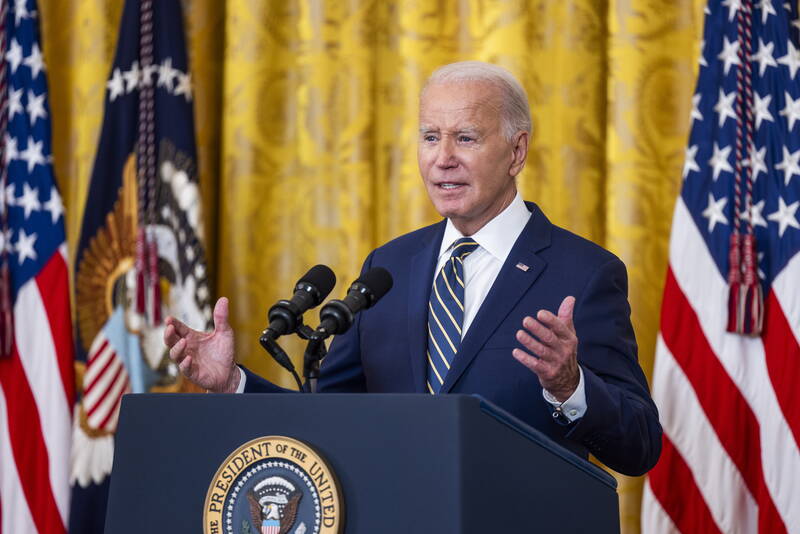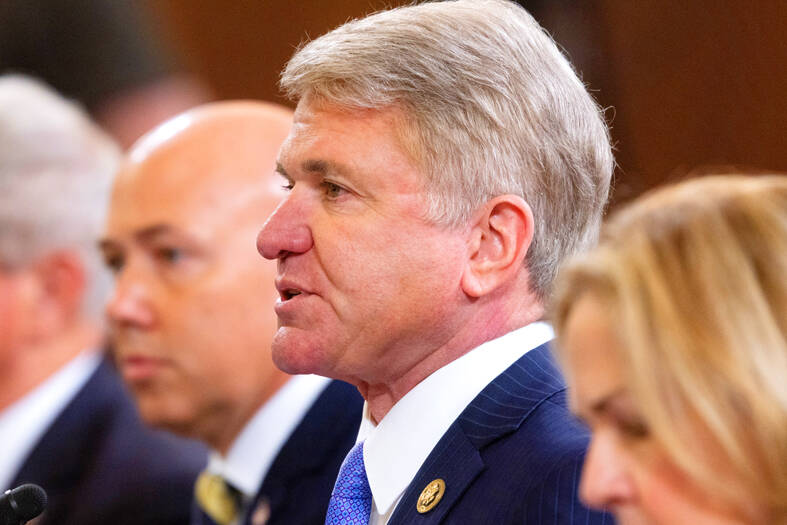Taiwan yesterday thanked the US for approving a military transfer of US$80 million under the Foreign Military Financing (FMF) program which, foreign media said, is normally used for sovereign states.
The US Department of State on Wednesday notified the US Congress of the aid, saying that the items provided through the FMF would “be used to strengthen Taiwan’s self-defense capabilities through joint and combined defense capability and enhanced maritime domain awareness and maritime security capability,” The Associated Press (AP) reported yesterday.
After years of assisting Taiwan through its Foreign Military Sales program, this is the first time the US is providing military aid under the FMF to Taiwan.

Photo: EPA
The transfer is part of the Omnibus Consolidated Appropriations Act, which US President Joe Biden signed in December, that allows up to US$2 billion in direct loans to Taiwan for military purposes.
The AP said that although the package is “modest” in amount, “the implications of using the so-called Foreign Military Financing program to provide it will likely infuriate China.”
“FMF simply enables eligible partner nations to purchase US defense articles, services, and training through either Foreign Military Sales or, for a limited number of countries, through the foreign military financing of direct commercial contracts program,” The AP quoted two US officials as saying on condition of anonymity.

Photo: EPA-EFE
The language used in the aid “implied that Taiwan is or could be compared to a ‘nation’ or a ‘country,’” The AP said, adding that the only other time the US has provided military assistance under the FMF to a non-nation-state was to the African Union.
A State Department spokesperson told the Central News Agency that the aid is in compliance with the Taiwan Relations Act (TRA) and the US’ long-held “one China” policy remains unchanged.
US Representative Michael McCaul, chairman of the US House of Representatives Committee on Foreign Affairs, issued a statement on Wednesday saying that he was glad the Biden administration decided to provide the aid to Taiwan.
“These weapons will not only help Taiwan and protect other democracies in the region, but also strengthen the US’ deterrence posture and ensure our national security from an increasingly aggressive CCP,” he said, referring to the Chinese Communist Party.
The notification provided to the US Congress said that the items that would be paid for under FMF might include: air and coastal defense systems, armored vehicles, infantry fighting vehicles, drones, ballistic missile and cyber defenses, and advanced communications equipment, The AP said.
The fund might also be used to pay for protective gear, an array of small, medium and heavy weapons systems, ammunition, armored and infantry fighting vehicles, as well as training for Taiwanese military forces, it said.
The package followed the military assistance of US$345 million provided by the US to Taiwan in July through the Presidential Drawdown Authority that the US Congress authorized last year and the US$500 million arms sale package, which includes F-16 Infrared Search and Track systems, to the nation earlier this month.
The Ministry of Foreign Affairs and the Ministry of National Defense thanked the US for helping Taiwan strengthen its self-defense capabilities based on the TRA and the “six assurances.”

The US government has signed defense cooperation agreements with Japan and the Philippines to boost the deterrence capabilities of countries in the first island chain, a report by the National Security Bureau (NSB) showed. The main countries on the first island chain include the two nations and Taiwan. The bureau is to present the report at a meeting of the legislature’s Foreign Affairs and National Defense Committee tomorrow. The US military has deployed Typhon missile systems to Japan’s Yamaguchi Prefecture and Zambales province in the Philippines during their joint military exercises. It has also installed NMESIS anti-ship systems in Japan’s Okinawa

‘WIN-WIN’: The Philippines, and central and eastern European countries are important potential drone cooperation partners, Minister of Foreign Affairs Lin Chia-lung said Minister of Foreign Affairs Lin Chia-lung (林佳龍) in an interview published yesterday confirmed that there are joint ventures between Taiwan and Poland in the drone industry. Lin made the remark in an exclusive interview with the Chinese-language Liberty Times (the Taipei Times’ sister paper). The government-backed Taiwan Excellence Drone International Business Opportunities Alliance and the Polish Chamber of Unmanned Systems on Wednesday last week signed a memorandum of understanding in Poland to develop a “non-China” supply chain for drones and work together on key technologies. Asked if Taiwan prioritized Poland among central and eastern European countries in drone collaboration, Lin

Renewed border fighting between Thailand and Cambodia showed no signs of abating yesterday, leaving hundreds of thousands of displaced people in both countries living in strained conditions as more flooded into temporary shelters. Reporters on the Thai side of the border heard sounds of outgoing, indirect fire yesterday. About 400,000 people have been evacuated from affected areas in Thailand and about 700 schools closed while fighting was ongoing in four border provinces, said Thai Rear Admiral Surasant Kongsiri, a spokesman for the military. Cambodia evacuated more than 127,000 villagers and closed hundreds of schools, the Thai Ministry of Defense said. Thailand’s military announced that

CABINET APPROVAL: People seeking assisted reproduction must be assessed to determine whether they would be adequate parents, the planned changes say Proposed amendments to the Assisted Reproduction Act (人工生殖法) advanced yesterday by the Executive Yuan would grant married lesbian couples and single women access to legal assisted reproductive services. The proposed revisions are “based on the fundamental principle of respecting women’s reproductive autonomy,” Cabinet spokesperson Michelle Lee (李慧芝) quoted Vice Premier Cheng Li-chiun (鄭麗君), who presided over a Cabinet meeting earlier yesterday, as saying at the briefing. The draft amendment would be submitted to the legislature for review. The Ministry of Health and Welfare, which proposed the amendments, said that experts on children’s rights, gender equality, law and medicine attended cross-disciplinary meetings, adding that